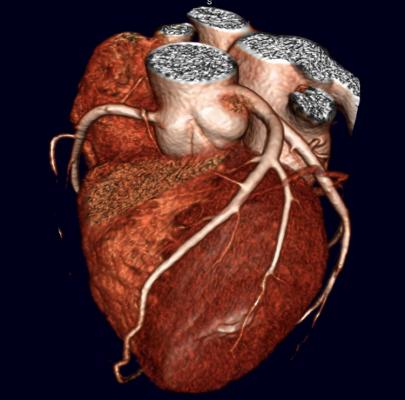
Image courtesy of Toshiba Aquilion
November 25, 2014 — Between 70 and 80 percent of patients with the connective tissue condition Marfan syndrome have aortic-root dilation, which happens when the aorta becomes too large and tears. This condition can result in serious illness and sometimes death. A National Institutes of Health-funded study comparing treatment with widely used blood pressure medications, atenolol or losartan, in patients with Marfan syndrome who had an enlarged aortic root, found no significant difference in the rate of aortic-root dilation between the two treatment groups over three years.
The results of the “Atenolol versus Losartan in Children and Young Adults with Marfan Syndrome” study, supported by NIH’s National Heart, Lung, and Blood Institute (NHLBI), were presented at the American Heart Association (AHA) Scientific Sessions in Chicago.
Marfan syndrome is a genetic disorder that affects connective tissue. Features of the disorder are most often found in the heart, blood vessels, bones, joints and eyes. Standard care includes frequent cardiac imaging, exercise restriction, administration of a beta-blocker such as atenolol or other medications that may decrease the rate of aortic enlargement and elective aortic-root replacement when the aortic root becomes too large. Although early diagnosis and refined medical and surgical management have improved survival, patients with Marfan syndrome continue to have high rates of complications and death from heart problems, even at a young age.
This randomized trial, which was conducted by the NHLBI’s Pediatric Heart Network, ran from 2007-2011 at 21 clinical centers in the United States, Canada and Belgium and included 608 patients aged 6 months to 25 years.
The two drugs work in different ways. Atenolol works by relaxing blood vessels and slowing heart rate to improve blood flow and decrease blood pressure. Losartan blocks the action of certain natural substances that tighten the blood vessels, allowing the blood to flow more smoothly and the heart to pump more efficiently.
Previous small studies had suggested that losartan might be more effective in slowing aortic-root enlargement than atenolol, which is the most common current therapy. The NIH-funded study, the largest study to date, showed that there is no important difference between the two drugs when used for this purpose.
Although the rate of change in the aortic root did not differ between treatment groups, the severity of aortic-root enlargement decreased over time in both groups, particularly in young subjects. The cause of this outcome is unknown. Further research is necessary to evaluate the magnitude of this benefit.
The trial was supported by the by U01 grants from the NHLBI and the FDA Office of Orphan Products Development. Additional support was provided by The Marfan Foundation, Merck & Co., Inc. and Teva Canada Limited.
For more information: www.nhlbi.nih.gov


 January 05, 2026
January 05, 2026 









